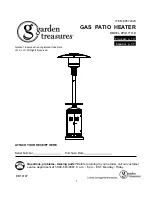
4
For either a confined or unconfined space in a building of
tight construction with inadequate infiltration, air must be
drawn from the outdoors or from spaces that freely
communicate with the outdoors. Two permanent openings
located as indicated above are to be provided as follows:
1.
When communicating with outdoors directly or by
means of vertical ducts
, each opening shall have a
free area of not less than one square inch per 4,000
BTU/Hr of total input of all appliances in the space.
2.
When communicating with outdoors by means of
horizontal ducts,
each opening shall have a free area
of not less than one square inch per 2,000 BTU/Hr of
total input of all appliances in the space.
For detailed requirements see:
•
In Canada, CAN/CGA- B149 Installation Codes
•
In U.S.A., ANSI Z223.1/NFPA 54, National Fuel Gas
Code.
WARNING!
1.
Flammable materials gasoline, pressurized
containers, or any other items or articles that are
potentially fire hazards must never be placed on or
adjacent to the heater. The appliance area must be
kept free of all combustible materials, gasoline and
other flammable vapors and liquids.
2.
Do not obstruct the flow of combustion and
ventilation air to the appliance.
CLEARANCE
The WR400-1 is design certified for installation on a
combustible wall and for installation in an alcove or closet
with minimum clearances to combustible construction of
0mm from back, 102mm (4 inches) from sides, 305mm (12
inches) from top and bottom, and 102mm (4 inches) from
front. A minimum of 305mm (12 inches) shall be allowed for
maintenance of serviceable parts. Clearance from vent is
dependent upon the clearance rating of the venting material
used; type B-1 vent is approved for 1 inch clearance, B-2
vent for 2 inch, etc.
MOUNTING
The WR400-1 is design certified for mounting to a wall.
The heater must not be installed on a carpeted wall. The
heater must be mounted to the wall using appropriate
anchoring materials.
Note: If wall is a stud wall sheathed with plasterboard it is
recommended that support board(s), either 1 x 4’s or ½ “
(minimum) plywood first be attached across a pair of studs
and then the heaters should be attached to the support
boards. See Figure 2.
Figure 2
Expansion and contraction of piping due to changing water
temperature in the pipes imparts movement to the heater
which, if mounted directly to a brittle, friable board, such as
plasterboard, can cause failure of mounting.
THIS APPLIANCE MUST BE INSTALLED IN ACCORDANCE WITH THE NATIONAL FUEL GAS CODE ANSI Z223.1/
NFPA 54 IN U.S.A OR CAN/CGA- B149 INSTALLATION CODES IN CANADA. LOCAL CODES AND/OR
REQUIREMENTS OF THE AUTHORITY HAVING JURISDICTION MUST BE FOLLOWED.
WALL STUDS
1”X4” SUPPORT BOARDS





































